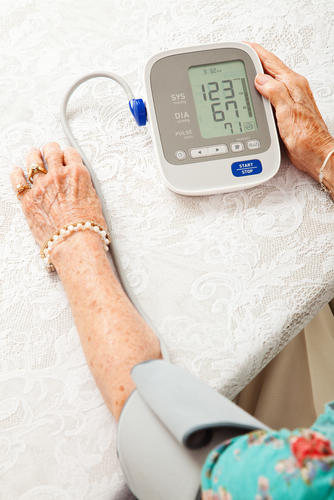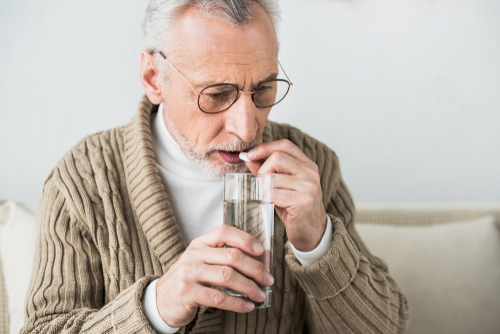In 2017, new blood pressure guidelines were released by The American Heart Association and the American College of Cardiology. Previously, a blood pressure of 140 over 90 was considered normal. The new guidelines state that a normal range means your blood pressure must be under 120 over 80. There are now three categories of high blood pressure:
- Elevated blood pressure: If your systolic blood pressure (the top number) is between 120 and 129 and you don’t have a diagnosis of hypertension, you fall into the category of elevated blood pressure.
- Stage I high blood pressure (hypertension): This is when the systolic blood pressure is between 130 and 139 or the diastolic pressure (the bottom number) is between 80 and 89.
- Stage II high blood pressure.: This is when the blood pressure is over 140 systolic or 90 diastolic.
If you fall into the elevated blood pressure range, the recommendations do not include medications. Rather, you will be encouraged to make diet and lifestyle changes. If you fall into the Stage I or II hypertension, your doctor will prescribe medication along with the diet and lifestyle changes.

To be diagnosed with hypertension, you must have two careful readings taken on two different occasions. Careful readings means you did not just drink a caffeinated beverage, or smoke a cigarette, or exercise. You should be comfortably seated with your arm supported and muscles relaxed when your blood pressure is taken.
Because there are variables that can impact your blood pressure, it is suggested that you wear a digital monitor that will record your blood pressure throughout the day or, you or your caregiver will need to take your blood pressure at different times during the day with your home cuff. You should take your home cuff with you to the doctor to have your machine’s accuracy validated.
Hypertension is referred to as the “silent killer.” The reason is that most of the time there are no symptoms with hypertension. Most seniors are unaware that their blood pressure is elevated until they have a comprehensive geriatric assessment that includes a blood pressure reading. Untreated hypertension can cause significant damage. A 20-point elevation of your systolic pressure or a 10-point elevation of your diastolic pressure doubles your chance of a fatal heart attack, stroke, or other cardiovascular event.
To successfully control your hypertension, you need to use the team approach. You and your health care providers have to work together to be successful. What are some things you can do to treat your hypertension? Consider these:
- Lose weight: You probably knew this was coming! But losing just 10 pounds can lower your blood pressure.
- Watch what you eat: The important thing is to lower your sodium (salt) intake. Read the labels on the processed foods you purchase. Make your meals so that you can control the amount of salt included. Avoid high-sodium foods like cold cuts, pizza, and canned soups. Cut back on fast food.
- Exercise: A half-hour five days a week will help you lose weight and improve your health. Walking the dog counts. Ride your bike or work in the garden. Use the walk-behind mower instead of a rider mower for part of your lawn. Incorporate exercise into your daily activities, and you will be more likely to continue. Add some weight lifting to your routine to boost your workout to a whole new level. Exercise for seniors with limited mobility will help with balance and endurance.
- Limit alcohol: A limit of one drink per day is reasonable. Drinking too much too often can raise your blood pressure.

- Reduce stress Try meditation, Tai Chi, or controlled breathing exercises. High levels of stress will release hormones that cause your blood vessels to constrict, raising your blood pressure. Stress leads to negative coping strategies like eating or using alcohol or drugs. Stress can also affect your sleeping patterns. If you are trying to work and care for your family when you feel exhausted, your stress level is increased again. It is very important to get (and keep!) stress under control.

- Take your prescribed medications. Take your medication as prescribed and try to take it at the same time each day.
Even if you don’t currently have high blood pressure, the odds of getting it in at some point in your lifetime can be high if you aren’t caring for yourself. According to one study, our lifetime risk is 90%. It is thought this high number is related to the fact that we are overweight and living longer. So, the above recommendations for lowering blood pressure are important for all of us. A healthy lifestyle and diet may not prevent the onset of hypertension, but small changes can have a big impact on the quality of our life throughout the years.


They are the best! They try to accommodate
me as I’m always having to switch or come in early for my appointment!
Thank you guys you have no idea how much easier you make
my life. Love the people here and the support.